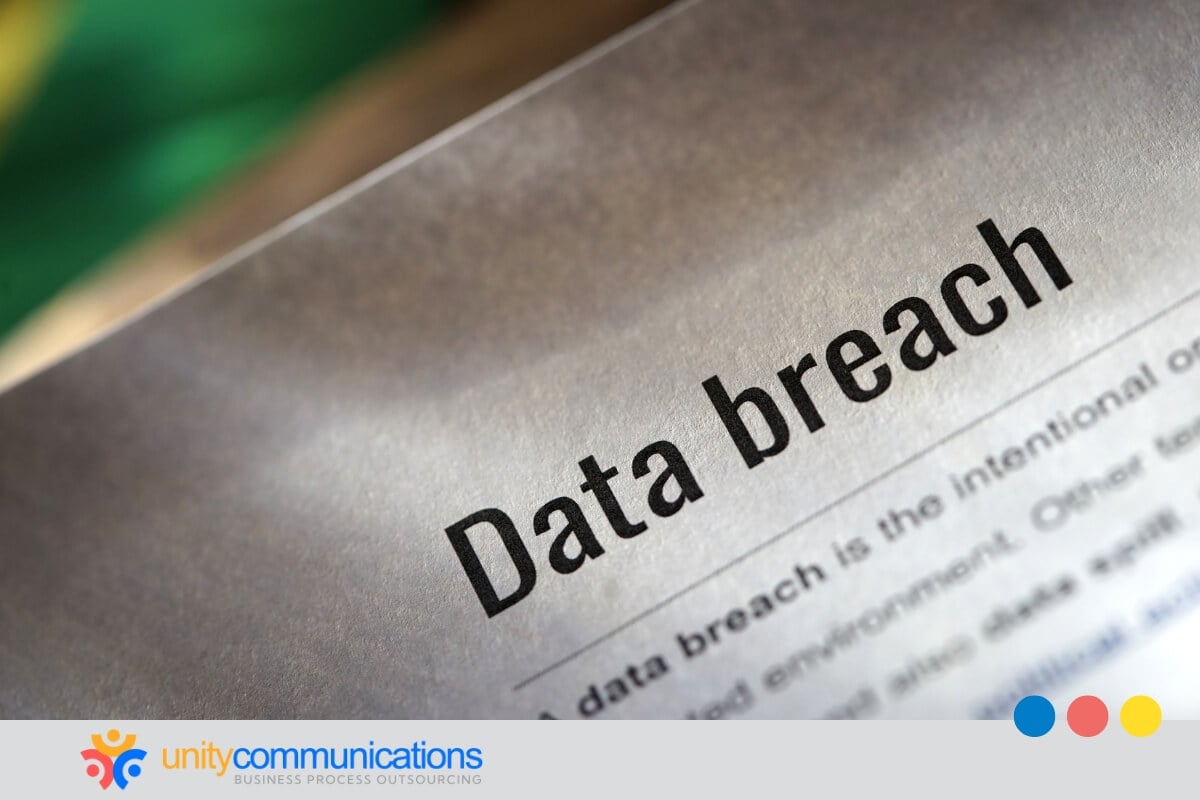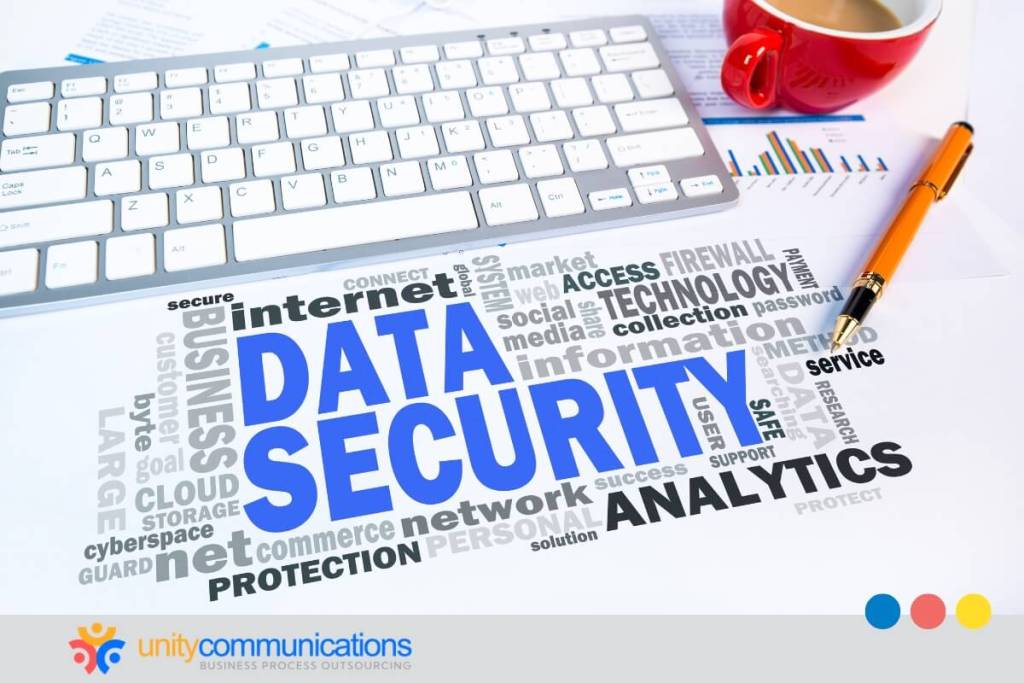IN THIS ARTICLE
Table of Contents
As businesses go global and digital, they run the risk of data breaches. Robust security measures and mitigation strategies are required to ensure business continuity.
Thus, many rely on employer of record (EOR) services to manage employee and business information based on global standards. Service providers comply with laws, conduct regular audits, and secure data.
If you want to learn how employers of record manage data, this article is for you. It highlights their data management strategies for global teams and offers security tips for a successful EOR partnership. Keep reading!
Importance of data security in global businesses’ HR functions

Data security has become indispensable for international companies’ human resource (HR) management, protecting business secrets and employee information.
HR departments manage a vast amount of data, including:
- Employee names
- Addresses
- Social security numbers
- Financial data
- Health records
- Performance evaluations
With employees working remotely across different countries and data traversing borders and networks, global businesses and teams are vulnerable to cyber threats. Local regulations and varying security practices add another layer of complexity.
Potential data security risks of working with a global remote team
The dispersed nature of a global workforce makes securing data more challenging. Businesses partner with employers of record for data transfer, device, and network security while complying with industry regulations.
In addition, cybercriminals are constantly devising new methods to steal or exploit data, making robust and updated security strategies critical.
Here are a few common HR data security risks associated with employing a global remote team:
- Expanded attack surface. Using personal devices and public networks increases data security risks due to limited information technology (IT) control, outdated software, and potential user susceptibility.
- Employee management challenges. With a geographically dispersed workforce, directly observing employee behavior and identifying potential security risks is challenging.
- Data transfer and compliance risks. Malicious actors can intercept information if proper security measures are not in place. The General Data Protection Regulation (GDPR) and the California Consumer Privacy Act (CCPA) have stringent regulations regarding data transfers.
Consequences of data breaches in global employment
Cyberattacks can result in compliance violations that hurt the business. As a global employer, you must record and watch out for the following consequences of data security breaches:
- Regulatory scrutiny. Noncompliance with federal and state data security laws can lead to investigations and fines.
- Compliance challenges. Data breaches expose inconsistencies in compliance practices across different regions, complicating regulatory adherence.
- Employee lawsuits. Affected workers might seek redress, resulting in costly lawsuits and settlements.
- Erosion of employee trust. A breach damages trust as employees might feel their privacy has been violated and question your company’s commitment to data security.
- Workforce disruption. Cyberattacks can decrease employee productivity. Mitigating further damage by resetting passwords or suspending access to specific systems can slow down operations.
- Reputational damage in multiple markets. Data breaches quickly become global news, leading to lost business opportunities and difficulties attracting talent.
How employer of record services promote data security in global employment

EOR firms manage diverse data privacy regulations and develop robust solutions to protect your business information. But what exactly is EOR? A type of business process outsourcing, it involves partnering with an external firm to act as a legal employer for a company’s workforce.
Whereas information technology (IT) support outsourcing companies manage technical tasks, EOR providers handle various data entry services and HR tasks. Examples include payroll processes, benefits administration, and tax compliance.
EOR services can streamline HR functions, comply with labor laws, provide access to global talent, and accelerate time to market while reducing costs. Its many benefits make it a widespread practice worldwide. The global EOR industry reached a market value of $4.29 billion in 2021 and can grow to over $8 billion by 2031.
Employers of record ensure data security while managing a global remote team in the following ways:
1. Standardized security protocols
EOR firms enforce consistent security protocols organization-wide to protect employee data regardless of location. They combine various measures to safeguard sensitive information, such as the following:
- Data encryption. EORs convert sensitive data from plaintext into ciphertext, rendering it useless when intercepted on unsecured networks.
- Access controls. EOR firms use access controls to limit data access to authorized personnel, regardless of location or device.
- Data minimization. To reduce the frequency and impact of security breaches, EORs can restrict the amount of data collected and stored on remote devices.
- Incident response plans. EOR vendors use these strategies to contain, quickly investigate, and remediate data security incidents.
- Employee training. As part of their HR duties, EORs educate remote employees on best practices for handling sensitive data and identifying phishing attempts.
2. Secure data storage and management
Where and how you store employee information is critical. Employer of record service providers invest in secure data centers with restricted security access, environmental controls, and advanced encryption technologies.
The following measures help EOR firms safeguard sensitive employee and company information:
- Data encryption at rest and in transit
- Data residency considerations
- Data backup and disaster recovery
EORs also follow relevant data residency laws in the regions where your remote staff operates. For example, the European Union (EU)’s GDPR restricts the transfer of personal data from the EU to countries with inadequate data protection laws. Meanwhile, China’s Cybersecurity Law mandates keeping data that can affect the country’s safety and social stability within its borders.
3. Expert compliance management
EOR firms employ dedicated compliance specialists who stay current on data privacy and security regulations across industries and locations. They work closely with your business to align with the global workforce’s needs and jurisdictional requirements.
Additionally, EOR providers conduct gap analyses to identify areas where your current practices might not align with relevant regulations and recommend appropriate measures to avoid noncompliance.
Throughout your partnership, the employer of record can implement data security compliance measures, such as:
- Developing and maintaining standardized data collection and processing procedures
- Establishing clear data retention policies and practices for deleting information
- Offering mechanisms for employees to access, correct, or delete their data
4. Regular security audits and updates
EOR firms safeguard your global workforce’s environment with regular security audits, depending on your business’s size and risk profile. These assessments can be internal, where EOR providers leverage their security team, or external, where they engage independent professionals.
Auditors usually examine the following:
- Network security (e.g., firewalls, intrusion detection/prevention systems, network segmentation, vulnerability management, and wireless network security)
- Data security (e.g., data loss prevention, classification, encryption, access controls, backups, and recovery)
- System security (e.g., operating system hardening, patch management, application security, user account management, logging, and monitoring)
- Incident response plans (e.g., plan existence and documentation, incident identification and escalation, containment and eradication, recovery and remediation, and lesson learned)
- Employee training (e.g., regular occurrence of training, existence of role-based programs, training effectiveness, employee knowledge of reporting procedures, and overall security culture)
EOR firms also update platforms and systems by continuously monitoring industry trends, maintaining platform vendor relationships, and implementing phased rollouts. Additionally, they refresh employee training programs. They upgrade the materials, use microlearning modules, and offer accessible and flexible training formats (online, in-person, etc.).
5. Globalized employee privacy rights management
EOR providers clearly communicate data management to employees and use well-designed, regulation-compliant forms to collect and handle the team’s personal information.
Your employer of record can also provide data security training or resources for their teams and your employees. These programs educate them about privacy regulations, best practices for handling sensitive information, and steps for identifying and reporting breaches.
This transparency builds trust with your global remote team and clarifies their rights.
Data security best practices for an EOR partnership

Although EOR services enhance data privacy for your global workforce, proper planning is still essential to ensure the partnership succeeds.
Here are steps to consider:
1. Select a reputable EOR
Who you partner with can make or break your efforts on employee and business data confidentiality. Vet the EOR firm by assessing its data privacy and security measures.
Examine its marketing materials, websites, case studies, and client testimonials. Scheduling calls or meetings with the employer of record’s data security teams and requesting references also help evaluate their capabilities. Some crucial criteria to look out for include:
- Security certifications. Prioritize EOR firms with industry-recognized certifications, such as SOC 2 and ISO 27001.
- Data handling policies and procedures. Request detailed information on the EOR’s data encryption, access control, minimization, retention, and disposal processes.
- Incident response plan. Assess whether the EOR has a documented strategy in case of a data breach, including notification procedures.
2. Establish clear protocols for data access and sharing
Collaborate with the chosen EOR to document data access and sharing procedures. These protocols should define the following:
- Employee data access (based on job roles and responsibilities)
- The data they can access and for what purpose
- The security measures when transferring or sharing employee data
- The process for requesting and granting access to employee data
Verify that the EOR collects and stores only essential employee data for critical HR processes. If your business operates in regions with data residency regulations, work with your employer of record to keep employee data secure in required locations.
3. Maintain open communication on security protocols
Set regular meetings or calls with your EOR security team to discuss data privacy updates, new threats, and any incidents that might have occurred. Request regular reports detailing its security posture, including any identified vulnerabilities and remediation plans.
These steps motivate employees to report suspicious activity related to data security or potential vulnerabilities for quicker incident response.
4. Engage in joint data protection training for employees
Run data protection training programs for internal and remote employees. They should detail data privacy regulations, best practices, phishing scams, and steps to identify and report suspicious activities.
Offer multi-language training programs to empower global teams to identify suspicious activity and take appropriate steps to protect sensitive data.
The bottom line
A data security-focused EOR ensures the safe handling of the global team’s personal information with compliance expertise and secure infrastructure.
The EOR also helps mitigate risks of data breaches in HR processes through standardized security protocols. These include regular audits, security updates, and privacy rights management.
Give your employees the robust data protection they deserve. Let’s connect to learn more about EOR services and how they can help enhance your data security.





